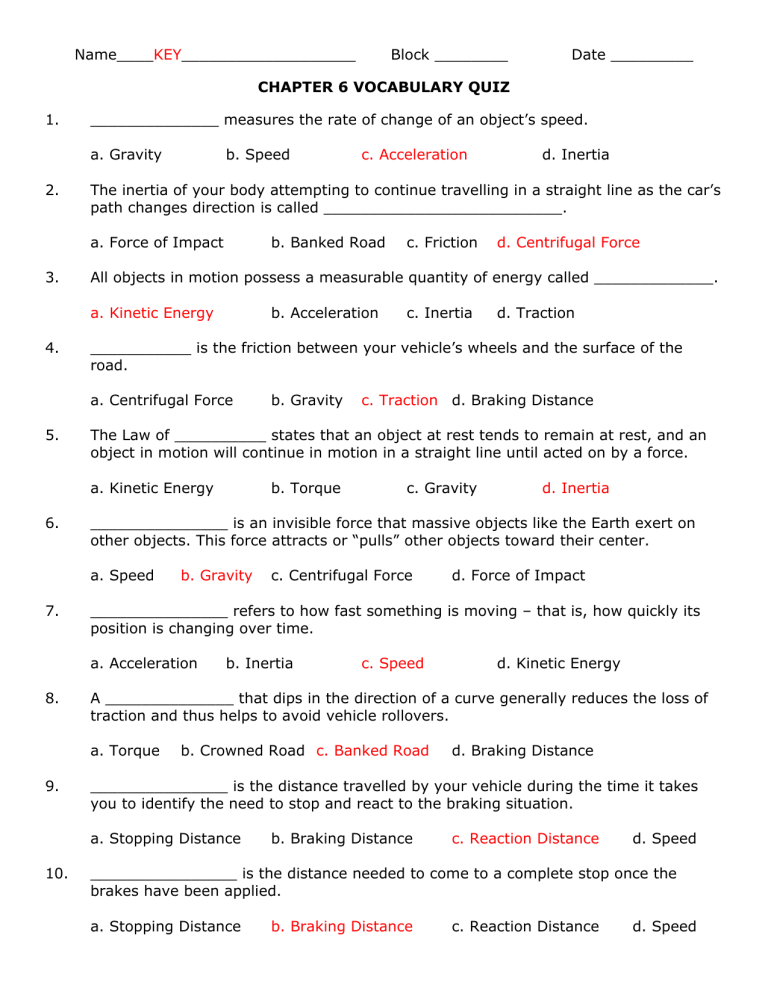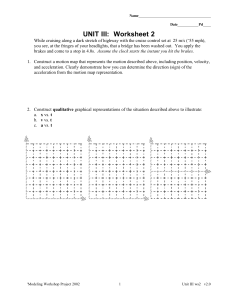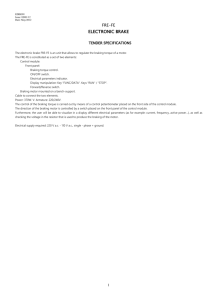
Name____KEY___________________ Block ________ Date _________ CHAPTER 6 VOCABULARY QUIZ 1. ______________ measures the rate of change of an object’s speed. a. Gravity 2. b. Speed b. Banked Road b. Acceleration c. Gravity c. Centrifugal Force b. Inertia d. Inertia d. Force of Impact c. Speed d. Kinetic Energy A ______________ that dips in the direction of a curve generally reduces the loss of traction and thus helps to avoid vehicle rollovers. b. Crowned Road c. Banked Road d. Braking Distance _______________ is the distance travelled by your vehicle during the time it takes you to identify the need to stop and react to the braking situation. a. Stopping Distance 10. c. Traction d. Braking Distance _______________ refers to how fast something is moving – that is, how quickly its position is changing over time. a. Torque 9. b. Gravity b. Torque b. Gravity a. Acceleration 8. d. Traction _______________ is an invisible force that massive objects like the Earth exert on other objects. This force attracts or “pulls” other objects toward their center. a. Speed 7. c. Inertia The Law of __________ states that an object at rest tends to remain at rest, and an object in motion will continue in motion in a straight line until acted on by a force. a. Kinetic Energy 6. d. Centrifugal Force ___________ is the friction between your vehicle’s wheels and the surface of the road. a. Centrifugal Force 5. c. Friction All objects in motion possess a measurable quantity of energy called _____________. a. Kinetic Energy 4. d. Inertia The inertia of your body attempting to continue travelling in a straight line as the car’s path changes direction is called __________________________. a. Force of Impact 3. c. Acceleration b. Braking Distance c. Reaction Distance d. Speed ________________ is the distance needed to come to a complete stop once the brakes have been applied. a. Stopping Distance b. Braking Distance c. Reaction Distance d. Speed 11. _______________ is the ability of a force to cause an object to rotate. a. Speed b. Torque c. Kinetic Energy d. Inertia 12. An object’s __________________ is the point about which the object’s weight is centered. a. Center of Gravity b. Torque c. Centrifugal Force d. Traction 13. ______________ means adding weight to your vehicle’s weight as measured when it is empty. a. Gravity b. Torque c. Loading d. Friction 14. ________________ are higher in the center than on the sides. They promote water runoff after rains to reduce the risk of hydroplaning. a. Banked Roads b. Uniform Speed Zones c. Center of Gravity d. Crowned Roads 15. ______________ is turning too sharply into a curve. This can cause your rear wheels to slide out, forcing you into a skid. a. Understeering b. Maximum Speed c. Braking Distance d. Oversteering 16. ______________ is not turning sufficiently to round the curve. This can cause you to drift into an outside lane, off the road, or into the opposing lane of travel. a. Understeering b. Minimum Speed c. Braking Distance d. Oversteering 17. _________________ consists of a sensor mounted on each wheel, that is capable of determining whether the wheel locks or stops rotating during braking. a. Threshold Braking c. Antilock Braking System (ABS) b. Pumping the Brakes d. Locking the Brakes 18. __________________ involves using a full and firm application of the brake pedal up to the point where the brakes lock and cause the vehicle to enter a skid. a. Threshold Braking c. Antilock Braking System (ABS) b. Pumping the Brakes d. Locking the Brakes 19. _________________ is a method of emergency braking, involving alternately applying the brakes completely until they lock and then releasing them in rapid succession. a. Threshold Braking c. Antilock Braking System (ABS) b. Pumping the Brakes d. Locking the Brakes 20. _________________ is the most radical braking technique and should be used only when there is no time to react otherwise or use alternative braking methods. a. Threshold Braking c. Antilock Braking System (ABS) b. Pumping the Brakes d. Locking the Brakes


